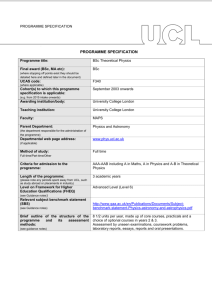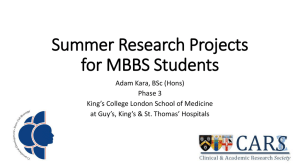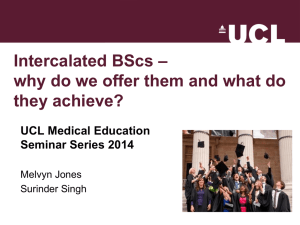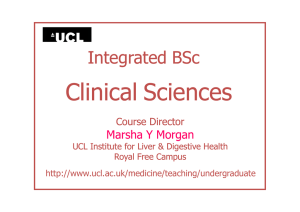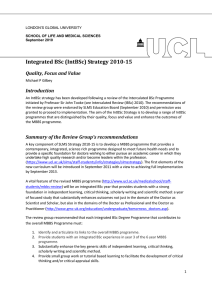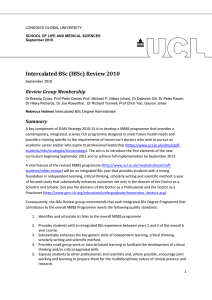Primary Health Care
advertisement
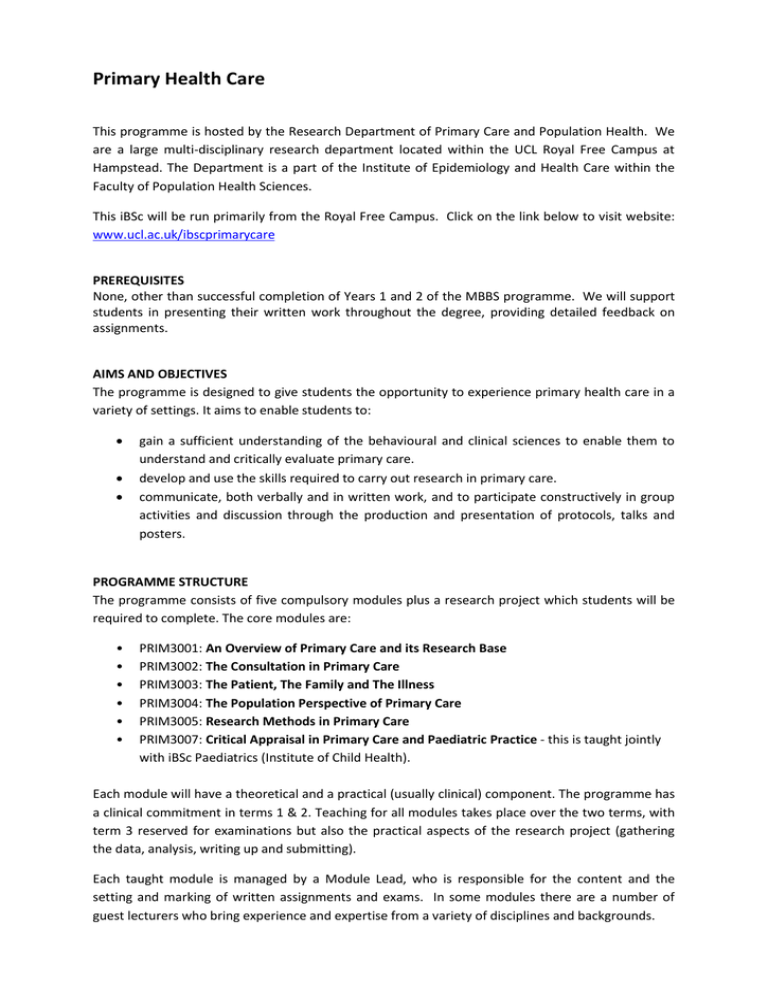
Primary Health Care This programme is hosted by the Research Department of Primary Care and Population Health. We are a large multi-disciplinary research department located within the UCL Royal Free Campus at Hampstead. The Department is a part of the Institute of Epidemiology and Health Care within the Faculty of Population Health Sciences. This iBSc will be run primarily from the Royal Free Campus. Click on the link below to visit website: www.ucl.ac.uk/ibscprimarycare PREREQUISITES None, other than successful completion of Years 1 and 2 of the MBBS programme. We will support students in presenting their written work throughout the degree, providing detailed feedback on assignments. AIMS AND OBJECTIVES The programme is designed to give students the opportunity to experience primary health care in a variety of settings. It aims to enable students to: gain a sufficient understanding of the behavioural and clinical sciences to enable them to understand and critically evaluate primary care. develop and use the skills required to carry out research in primary care. communicate, both verbally and in written work, and to participate constructively in group activities and discussion through the production and presentation of protocols, talks and posters. PROGRAMME STRUCTURE The programme consists of five compulsory modules plus a research project which students will be required to complete. The core modules are: • • • • • • PRIM3001: An Overview of Primary Care and its Research Base PRIM3002: The Consultation in Primary Care PRIM3003: The Patient, The Family and The Illness PRIM3004: The Population Perspective of Primary Care PRIM3005: Research Methods in Primary Care PRIM3007: Critical Appraisal in Primary Care and Paediatric Practice - this is taught jointly with iBSc Paediatrics (Institute of Child Health). Each module will have a theoretical and a practical (usually clinical) component. The programme has a clinical commitment in terms 1 & 2. Teaching for all modules takes place over the two terms, with term 3 reserved for examinations but also the practical aspects of the research project (gathering the data, analysis, writing up and submitting). Each taught module is managed by a Module Lead, who is responsible for the content and the setting and marking of written assignments and exams. In some modules there are a number of guest lecturers who bring experience and expertise from a variety of disciplines and backgrounds. PRIM3001: AN OVERVIEW OF PRIMARY CARE AND ITS RESEARCH BASE 0.5 unit Term 1 – Dr Tamar Koch Assessment: written essay (30%), unseen three-hour written exam (70%) This module covers the historical development of Primary Care and General Practice in the UK, and how its evolution has been influenced by political drives. Students will learn about the structure of Primary Care within the context of the wider NHS, what happens in General Practice and Primary Care, the variety of different primary care professionals and their roles, and how the UK’s health system compares to those of other countries’. This module takes place during Term 1. PRIM3002: THE CONSULTATION IN PRIMARY CARE 0.5 unit Term 1 & 2 – Dr Anita Berlin Assessment: written essay (30%), unseen three-hour written exam (70%) This module examines the doctor-patient interaction using various theoretical models before analysing the various tasks within consultations. Factors such as consultation style, the patient perspective and the cultural backgrounds of both doctor and patient will then be explored. There will be an opportunity to examine the student’s consulting style within the module. PRIM3003: THE PATIENT, THE FAMILY AND THE ILLNESS 0.5 unit Term 1 & 2 – Dr Surinder Singh Assessment: written essay (30%), unseen three-hour written exam (70%) This module will aim to give an overview of the various influences on patient's health, beliefs and behaviours, including personality variables, education, cultural background, social class and environment. It will look at patients’ and doctors’ perceptions of ill-health, the influences on patients’ health beliefs and behaviours, the role of family in the origin, recognition, and management of ill-health. Non-medical forms of primary health care will be reviewed. This module will draw on work from the social sciences such as anthropology, sociology and psychology. PRIM3004: THE POPULATION PERSPECTIVE 0.5 unit Term 1 & 2 – Dr Rob Aldridge, venue: Farr Institute Assessment: written essay (30%), unseen three-hour written exam (70%) This module enables students to understand the health needs of a population, how these may be assessed and the role of primary care services in meeting these needs. The themes include; principles of epidemiology, assessing the health needs of a population, preventing disease, promoting health, evaluating health care delivery and allocation of resources. This teaching takes place at the Farr Institute. PRIM3005: RESEARCH METHODS IN PRIMARY CARE 1.5 units Term 1, 2 & 3 – Dr Richard Meakin Assessment: research protocol (10%), ‘final’ dissertation (90%) Training in research methods is an essential component of this course and each student will be required to undertake a project in a primary care setting. This will include principles of scientific method, qualitative and quantitative research methods, ethical issues in research, statistical computer packages and their use, writing a scientific paper, and oral presentation of a project. You will be supported by a supervisor during your research. PRIM3007: CRITICAL APPRAISAL OF PRIMARY CARE AND PAEDIATRIC PRACTICE 0.5 unit Term 1 – Dr Rose Crowley, venue: most sessions at The Institute of Child Health Assessment: guidelines (30%), unseen three-hour written exam (70%) This module will be delivered as a series of interactive seminars as a joint module with students studying on the iBSc in paediatrics. The sessions will cover an introduction to evidence-based practice, library teaching on finding evidence and hands on searching skills, and key seminars on how to appraise a range of papers focusing on different types of study. There will be assessed coursework in which you will write a clinical guideline and an end of year assessment. The skills you acquire in this module should be relevant and valuable both as a student and in your future medical careers. Topics include: Evidence and literature searching; Cohort Studies; Diagnostic tests and screening; Randomised Controlled Trials; Systematic reviews; Case control studies; Appraising qualitative research and Clinical guidelines. TITLES OF PAST RESEARCH PROJECTS Information framing and the pre natal diagnosis of thalassemia Patients' views on new patient medicals Doctors' views about health promotion Are GPs involved in a tele-medicine trial representative of all GPs? An exploration of the role of GPs' receptionists (using anthropological methods) GPs' attitudes (in urban and rural areas) to treating IV drug users How people from the Asian community feel about HIV and AIDS Is there an incentive? attitudes of GPs to pharmaceutical reps Primary care services received by the children of people with substance misuse problems Condom use amongst students The needs and concerns of terminally ill cancer patients and their carer, nurse and GP Attitudes of GPs towards changes in the post graduate education system EXAMPLES OF PUBLICATIONS (iBSc STUDENT AUTHORS IN BOLD) RESULTING FROM THE iBSc PROGRAMME Knowledge, attitudes and beliefs towards waterpipe tobacco smoking and electronic shisha (eshisha) among young adults in London: a qualitative analysis. Kotecha S, Jawad M, Iliffe S. Prim Health Care Res Dev. 2015 Apr 13:1-9 http://www.ncbi.nlm.nih.gov/pubmed/25864374 Daan de Coster had his project published by the Cochrane library as a systematic review: Beclometasone for COPD [De Coster D, Jones M 2012]. Go to http://onlinelibrary.wiley.com/doi/10.1002/14651858.CD009769.pub2/abstract Joht Chandan has had an abstract accepted for the forthcoming Madingley Hall conference (January 2014): Do Special Constables in London feel that they are adequately prepared to meet their first aid responsibility to the General Public/Offenders? http://www.madingley2014.phpc.cam.ac.uk/userfiles/abstracts/SAPC2014Madingley_FULLABSTRAC TS.pdf Sam Bulford had his project published as a letter in journal of STI: Qualitative exploration of sexual health in old age [Bulford, S. J., & Singh, S. Sex Transm Infect. doi: 10.1136/sextrans-2012-050827] http://sti.bmj.com/content/early/2012/11/06/sextrans-2012-050827.full What are the patient held illness beliefs after a transient ischaemic attack (TIA) and do they determine secondary prevention activities; an exploratory study in a North London General Practice - Stania Kamara and Surinder Singh Primary Health Care Research & Development, FirstView Articles: pp.1-10, DOI: 10.1017/S146342361100051X, Published online by Cambridge University Press 24 November 2011 Course Publications by Faculty Staff: Jones M, Lloyd M, Meakin R. Intercalated BSc. In Primary Health Care – an outline of a new course. Medical Teacher 2001; 23(1):95-97 http://informahealthcare.com/doi/pdf/10.1080/01421590150214663 Jones M, Singh S, Lloyd M. “It isn’t just consultants that need a BSc”: student experiences of an intercalated BSc in Primary Health Care. Medical Teacher Vol 27, No2, 2005, pp. 164-168 http://informahealthcare.com/doi/pdf/10.1080/01421590400019567 Jones M, Singh S, Meakin R. Undergraduate research in primary care: is it sustainable? Primary Health Care Research and Development 2008; 9:85-95 http://discovery.ucl.ac.uk/15153/1/15153.pdf Jones, M, Eastwood, S, Hutt P, Singh S. A paper about the value or otherwise of doing a BSc as part of a medical degree: available at http://www.ncbi.nlm.nih.gov/pubmed/23962229 FOR FURTHER INFORMATION PLEASE CONTACT The Integrated BSc in Primary Health Care is held mainly at the Royal Free Campus with some teaching undertaken at the Farr Institute and Institute of Child Health. There are a limited number of places available on this programme. Programme Director: Dr Surinder Singh Email: s.singh2@ucl.ac.uk Tel: 020 7794 0500 ext. 36740 Programme Administrator: Sandra Gerrard Email: s.gerrard@ucl.ac.uk
